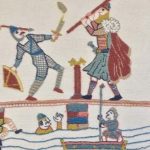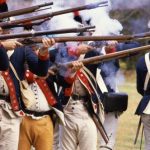 Movies and TV
Movies and TV  Movies and TV
Movies and TV  History
History 10 Dirty Government Secrets Revealed by Declassified Files
 Weird Stuff
Weird Stuff 10 Wacky Conspiracy Theories You Will Need to Sit Down For
 Movies and TV
Movies and TV 10 Weird Ways That TV Shows Were Censored
 Our World
Our World 10 Places with Geological Features That Shouldn’t Exist
 Crime
Crime 10 Dark Details of the “Bodies in the Barrels” Murders
 Animals
Animals The Animal Kingdom’s 10 Greatest Dance Moves
 Movies and TV
Movies and TV 10 Box Office Bombs That We Should Have Predicted in 2025
 History
History 10 Extreme Laws That Tried to Engineer Society
 History
History 10 “Modern” Problems with Surprising Historical Analogs
 Movies and TV
Movies and TV 10 Movie Adaptations That Ruined Everything for Some Fans
 History
History 10 Dirty Government Secrets Revealed by Declassified Files
 Weird Stuff
Weird Stuff 10 Wacky Conspiracy Theories You Will Need to Sit Down For
Who's Behind Listverse?

Jamie Frater
Head Editor
Jamie founded Listverse due to an insatiable desire to share fascinating, obscure, and bizarre facts. He has been a guest speaker on numerous national radio and television stations and is a five time published author.
More About Us Movies and TV
Movies and TV 10 Weird Ways That TV Shows Were Censored
 Our World
Our World 10 Places with Geological Features That Shouldn’t Exist
 Crime
Crime 10 Dark Details of the “Bodies in the Barrels” Murders
 Animals
Animals The Animal Kingdom’s 10 Greatest Dance Moves
 Movies and TV
Movies and TV 10 Box Office Bombs That We Should Have Predicted in 2025
 History
History 10 Extreme Laws That Tried to Engineer Society
 History
History 10 “Modern” Problems with Surprising Historical Analogs
10 Times Luck Won Battles
We live in a world where we are consistently taught that everything is about preparation and plans. However, our better judgment lets us realize that this position is not 100% correct in day-to-day life. The same is true of warfare.
Throughout history, military strategists have emphasized the importance of preparation, tactics, and leadership in securing victory on the battlefield. However, even the best-laid plans can be upended by factors beyond anyone’s control—whether it’s a sudden storm, a lost document, or sheer coincidence.
While skill and strategy play crucial roles in warfare, there are moments when luck, fate, or a twist of nature changes the course of history. This list delves into ten historical battles where luck played a decisive role, tipping the scales in favor of one side and altering the course of history. These instances remind us that in the chaos of war, sometimes the outcome hinges on an unpredictable stroke of luck.
Related: 10 Often Forgotten Battles That Helped Shape the Modern World
10 A Storm Saved Washington, D.C., from a British Assault
The War of 1812 was a tumultuous time for the young United States, and Washington, D.C., nearly met its demise at the hands of British forces on August 24, 1814. The British, determined to crush the American spirit, launched a fiery assault on the nation’s capital, setting key buildings ablaze, including the White House and the Capitol. As the city burned, it seemed inevitable that Washington, D.C., would be razed to the ground. However, nature had other plans.
A violent storm, possibly a hurricane, swept through the city, dousing the flames and sending the British troops into disarray. The storm was so fierce that it uprooted trees, tossed cannons, and forced the British soldiers to flee for cover. By the time the storm subsided, the British had lost their momentum and did not resume their attack, sparing the city from complete destruction. This unexpected turn of weather not only saved the capital but also became a symbol of resilience for the fledgling nation.[1]
9 The Five Minutes That Changed the Battle of Midway
The Battle of Midway in June 1942 was a pivotal moment in World War II’s Pacific Theater, and it hinged on a few crucial minutes of sheer luck. After the devastating attack on Pearl Harbor, Japan sought to deliver a knockout blow to the American Pacific Fleet. The Imperial Japanese Navy, confident in its superiority, launched a massive assault on Midway Atoll, hoping to lure the U.S. carriers into a trap. However, as American planes desperately attacked the Japanese fleet with little success, fortune intervened.
In a brief five-minute window, American dive bombers, arriving just as the Japanese were in the midst of rearming and refueling their planes, struck with devastating precision. The Japanese carriers, with their decks cluttered with bombs and fuel, became sitting ducks. In those fateful minutes, three of Japan’s four largest aircraft carriers were engulfed in flames and sunk. This incredible stroke of luck not only shifted the balance of naval power in the Pacific but also marked the beginning of Japan’s decline in World War II.[2]
8 Fog Saves Washington’s Troops at the Battle of Brooklyn
The summer of 1776 was a critical period for the Continental Army, as George Washington and his troops faced the might of the British Empire in New York. After being soundly defeated at the Battle of Brooklyn, Washington found himself in a perilous situation. His army, outnumbered and outmaneuvered, was trapped on Brooklyn Heights, with the East River behind them and the British forces closing in. The Americans’ only hope of survival was a daring nighttime evacuation across the river.
As the British prepared for a final assault, a thick fog rolled in just before dawn, shrouding Washington’s troops in a blanket of mist. Under cover of fog, the Continental Army silently slipped away, ferrying nearly 9,000 soldiers across the river to safety. By the time the fog lifted, the British were stunned to find the American positions abandoned. This miraculous escape, aided by the fortuitous weather, allowed the Revolutionary War to continue, ultimately leading to American independence.[3]
7 An Unplanned Bridge Capture at Remagen
In the final months of World War II, as Allied forces advanced into Nazi Germany, the swift capture of the Ludendorff Bridge at Remagen proved to be a game-changer—thanks to a stroke of luck. The bridge, spanning the Rhine River, was a crucial crossing point that the Germans intended to destroy to halt the Allied advance. However, a series of fortunate events led to its capture.
First, American forces, advancing faster than anticipated, reached the bridge before the Germans could demolish it. The explosives planted by the Germans failed to fully detonate, leaving the bridge intact. This unexpected stroke of luck allowed American troops to storm across the bridge, establishing a vital foothold on the eastern bank of the Rhine. The capture of the Ludendorff Bridge not only hastened the Allied invasion of Germany but also contributed significantly to the eventual defeat of the Third Reich.[4]
6 A Storm Saves England from the Spanish Armada
In 1588, the Spanish Empire, then the most powerful in the world, launched a massive fleet known as the Spanish Armada to invade England. The Armada, consisting of 130 ships, 8,000 sailors, and 18,000 soldiers, was intended to overthrow Queen Elizabeth I and restore Catholicism in England. However, as the Armada sailed through the English Channel, it encountered one of the most severe storms in Northern Europe’s history.
The storm scattered the Spanish ships, causing significant damage and disarray. The English navy, smaller and less powerful, seized the opportunity to attack, inflicting further damage on the already crippled Armada. As the Spanish fleet attempted to retreat, another violent storm struck, sinking many of the remaining ships. Only a fraction of the Armada limped back to Spain, marking the end of Spain’s dominance on the seas and the rise of England as a major naval power. This devastating loss for Spain was due less to English military prowess and more to the unpredictable fury of nature.[5]
5 Hemorrhoids and Rain Doom Napoleon at Waterloo
Napoleon Bonaparte, one of history’s greatest military minds, met his match at the Battle of Waterloo in 1815—but not solely because of the Duke of Wellington’s strategic brilliance. On the morning of the battle, Napoleon was suffering from severe hemorrhoids, which prevented him from riding his horse and surveying the battlefield as he usually did. This limited his ability to command effectively. To make matters worse, a torrential rainstorm had soaked the battlefield the night before, turning it into a muddy quagmire.
Napoleon, who relied heavily on artillery, was forced to delay his attack until the ground dried, but this delay gave the British and their Prussian allies time to regroup and reinforce their positions. When the battle finally commenced, the French forces struggled to maneuver in the mud, and their attacks were less effective. The combination of Napoleon’s physical ailment and the rain-soaked terrain contributed significantly to his defeat at Waterloo, marking the end of his reign and altering the course of European history.[6]
4 Mud Stops the French at the Battle of Agincourt
The Battle of Agincourt in 1415 is celebrated as one of England’s most iconic military victories, but it was a victory shaped by the weather as much as by strategy. The English army, led by King Henry V, was vastly outnumbered by the French forces, who were confident of an easy win. However, the night before the battle, heavy rains turned the battlefield into a sea of mud. The French knights, clad in heavy armor, found themselves struggling to advance across the slippery terrain. As they attempted to charge the English lines, their horses became bogged down in the mud, and many knights were thrown off balance and trampled.
The English longbowmen, positioned on higher ground, unleashed a devastating hail of arrows on the floundering French troops. The mud not only slowed the French advance but also created chaos in their ranks, turning what should have been a straightforward victory into a disastrous defeat. The Battle of Agincourt demonstrated how even the most formidable army can be undone by the forces of nature.[7]
3 The Lost Confederate Battle Plan at Antietam
The Battle of Antietam in September 1862 became the bloodiest single day in American history, and its outcome was significantly influenced by a stroke of luck. As Confederate General Robert E. Lee prepared for an ambitious invasion of the North, his battle plans were inadvertently lost and fell into Union hands. A Union soldier discovered the plans wrapped around three cigars in a field in Maryland. When Union General George McClellan received the intelligence, he realized he had a rare opportunity to strike Lee’s forces while they were divided.
Armed with this crucial information, McClellan moved swiftly to intercept the Confederates at Antietam Creek. The ensuing battle was brutal, with neither side gaining a decisive advantage, but Lee’s invasion was halted, and he was forced to retreat back to the South. The Union’s discovery of the lost battle plans not only prevented a potentially disastrous Confederate victory but also provided President Abraham Lincoln with the political momentum to issue the Emancipation Proclamation.[8]
2 A Luftwaffe Mistake Turns the Tide of the Battle of Britain
The Battle of Britain in 1940 was a critical turning point in World War II, and its outcome was influenced by a crucial mistake on the part of the German Luftwaffe. The Germans aimed to cripple the Royal Air Force (RAF) by targeting airfields and military installations, paving the way for a full-scale invasion of Britain. However, during one bombing raid, a German bomber accidentally dropped its payload on London, a civilian target. The British, incensed by the attack on their capital, retaliated by bombing Berlin. Hitler, enraged by the British counterattack, ordered the Luftwaffe to shift its focus from RAF airfields to bombing British cities in a campaign known as the Blitz.
This strategic blunder allowed the RAF to recover, repair its airfields, and rebuild its fighter strength. As a result, Britain was able to resist the German air assault, ultimately preventing the invasion. If not for that single accidental bombardment, it is widely believed that Germany might have achieved air superiority over Britain, potentially changing the course of the war.[9]
1 Typhoons Save Japan from Mongol Invasions Twice
The Mongol Empire, under the leadership of Kublai Khan, was one of the most formidable military forces in history, conquering vast territories across Asia and Europe. In the late 13th century, the empire set its sights on Japan, launching two massive invasion attempts. The first invasion in 1274 was met with fierce resistance by the Japanese samurai, but it was a powerful typhoon, known as the “divine wind” or kamikaze, that ultimately devastated the Mongol fleet, destroying one-third of their ships and forcing them to retreat.
Undeterred, Kublai Khan waited until he had secured control over Southern China before launching a second invasion in 1281 with a force ten times larger than the first. Despite heavy fighting, history repeated itself as another typhoon struck, wiping out two-thirds of the Mongol invasion force. These typhoons, which the Japanese believed were sent by the gods, saved Japan from Mongol domination, and the Mongol Empire never attempted another invasion. This extraordinary stroke of luck not only preserved Japan’s independence but also became a defining moment in Japanese history. [10]








